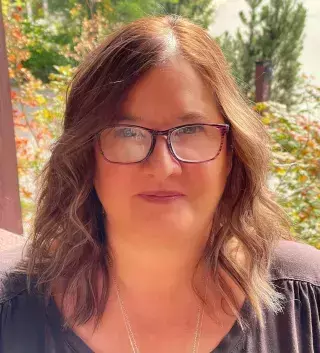Dr. Alicia Spidel
BSc (UBC) MA (UBC), PhD (University of Montreal), RCC
Alicia has worked as a Psychologist, counsellor, clinical supervisor, mental health coordinator and trainer in corrections and community-based counselling agencies, addictions services, and mental health, for over 20 years. In addition, she has lectured at SFU, Douglas College, Kwantlen, UBC, UFV, CityU, VIU, OK College, VIC, and JIBC in counselling psychology, criminology, and psychology courses. Her clinical and research interests include trauma, PTSD, violence, personality, and substance use and their impact on mental health, treatment and how these intersect with social justice. She has published over 50 journal articles and book chapters and have given over 200 presentations both nationally and internationally on these subjects. Her clinical work is grounded in practices of social justice, anti-oppression and compassion and she specializes in working with those who have experience individual and systemic forms of trauma. She provides workshops in Mindfulness, working with complex clients, and third wave therapies (DBT and ACT). Alicia is passionate about teaching and supervision and helping students reach their academic and career goals. In addition to teaching in the counselling department at KPU she also teaches in the criminology department due to her background in Forensic Psychology.
Areas of Interest
Third wave therapies (Mindfulness, DBT, and ACT) and their effectiveness
Trauma and PTSD
Social justice
Addictions
Suicide and self-harm
Psychopathy, Borderline, and Narcissistic personality disorders
Risk assessment
Psychosis
Shame and Guilt
Scholarly Work
- Diotte F, Potvin S, Lang D, Abdel-Baki A, Spidel A, Villeneuve M, Lecomte T. Comparison of Methamphetamine Induced Psychosis and Primary Psychotic Disorder: Scoping Review of Social Cognition. J Ment Health Clin Psychol (2022) 6(2): 1-18.
- Kealy D., Spidel A., & Sandhu S. (2021). Childhood maltreatment and suicidality among women seeking mental health care: the mediating effect of borderline personality features, moderated by age, Women & Health, DOI: 10.1080/03630242.2021.1968097
- Spidel, A., and Kealy, D. Sexual risk behaviour among mental health outpatients: Associations with distress, identity, and emotional neglect. (accepted).
- Spidel, A., Kealy, D., Kim, D., Sandhu, S., & Izbicki, A. (April, 2021). Dysfunctional individuation in the clinic: Associations with distress and early parental responsiveness. Current Psychology. https://doi.org/10.1007/s12144-021-01736-1
- Kealy, D., Ben-David, S., Spidel, A., Wadsley-Rose, S., and Kim, D. (2021). Self-reassurance moderated by identity dysfunction: Associations with distress and impairment. Journal of Counselling & Development.
- David Kealy, Matt S. Treeby, Simon M. Rice & Alicia Spidel (2020) Shame and guilt as mediators between dispositional optimism and symptom severity among mental health outpatients, Psychology, Health & Medicine, DOI: 10.1080/13548506.2020.1861313
- Spidel, A., Daigneault, I., Kealy, D., & Lecomte, T. (2019). Acceptance and commitment therapy for psychosis and trauma: Investigating links between trauma severity, attachment and outcome. Behavioural and cognitive psychotherapy, 47(2), 230-243.
- Kealy, D., Spidel, A., Sandhu, S., Kim, D., & Izbicki, A. (2018). Financial concerns and symptom distress among psychiatric outpatients. Journal of Public Mental Health.
- Kealy, D., Rice, S. M., Ogrodniczuk, J. S., & Spidel, A. (2018). Childhood trauma and somatic symptoms among psychiatric outpatients: Investigating the role of shame and guilt. Psychiatry Research, 268, 169-174.
- Spidel, A., Lecomte, T., Kealy, D., & Daigneault, I. (2018). Acceptance and commitment therapy for psychosis and trauma: Improvement in psychiatric symptoms, emotion regulation, and treatment compliance following a brief group intervention. Psychology and Psychotherapy: Theory, Research and Practice, 91(2), 248-261.
- Kealy, D., Spidel, A., & Ogrodniczuk, J. S. (2017). Self‐conscious emotions and suicidal ideation among women with and without history of childhood sexual abuse. Counselling and Psychotherapy Research, 17(4), 269-275.